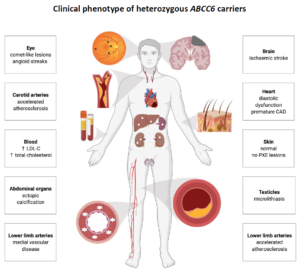Hereditary defects in the ABCC6 gene are common in the general population with an estimated 1% of individuals having such a defect in their genetic material. In this study, we examined the physical signs and symptoms in a group of 56 individuals having 1 ABCC6 defect, called ‘carriers’. We found that 24% of carriers have typical changes in their eyes (‘comet-like’), more than 75% have high cholesterol blood levels or take cholesterol-lowering drugs and one third of carriers have an abnormal functioning of the heart. Additionally, we found that carriers are at increased risk of developing fatty depositions in the blood vessel wall (atherosclerosis), while 26% of carriers had calcifications in abdominal organs like the kidney or liver and 28% of males had calcifications in the testicles. Because heterozygous carriers can benefit from (primary) cardiovascular prevention, we created guidelines enabling better diagnosis, treatment and follow-up. (By Dr. Lukas Nollet on behalf of all authors, https://jmg.bmj.com/content/early/2021/04/04/jmedgenet-2020-107565 )
Clinical and subclinical findings in heterozygous ABCC6 carriers: results from a Belgian cohort and clinical practice guidelines
(Visited 219 times, 1 visits today)
